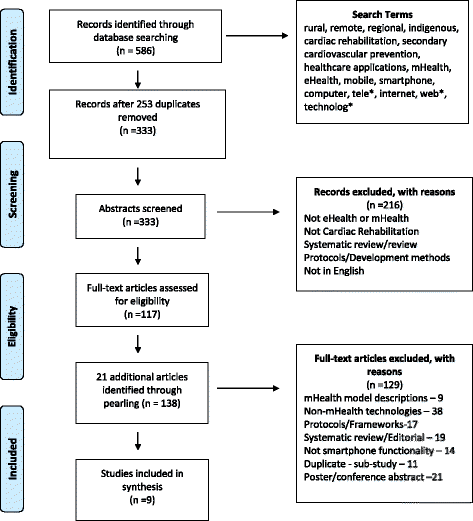Smartphones in the secondary prevention of cardiovascular disease: a systematic review
- PMID: 29415680
- PMCID: PMC5803998
- DOI: 10.1186/s12872-018-0764-x
Smartphones in the secondary prevention of cardiovascular disease: a systematic review
Abstract
Background: Cardiac Rehabilitation (CR) and secondary prevention are effective components of evidence-based management for cardiac patients, resulting in improved clinical and behavioural outcomes. Mobile health (mHealth) is a rapidly growing health delivery method that has the potential to enhance CR and heart failure management. We undertook a systematic review to assess the evidence around mHealth interventions for CR and heart failure management for service and patient outcomes, cost effectiveness with a view to how mHealth could be utilized for rural, remote and Indigenous cardiac patients.
Methods: A comprehensive search of databases using key terms was conducted for the years 2000 to August 2016 to identify randomised and non-randomised trials utilizing smartphone functionality and a model of care that included CR and heart failure management. Included studies were assessed for quality and risk of bias and data extraction was undertaken by two independent reviewers.
Results: Nine studies described a mix of mHealth interventions for CR (5 studies) and heart failure (4 studies) in the following categories: feasibility, utility and uptake studies; and randomised controlled trials. Studies showed that mHealth delivery for CR and heart failure management is feasible with high rates of participant engagement, acceptance, usage, and adherence. Moreover, mHealth delivery of CR was as effective as traditional centre-based CR (TCR) with significant improvement in quality of life. Hospital utilization for heart failure patients showed inconsistent reductions. There was limited inclusion of rural participants.
Conclusion: Mobile health delivery has the potential to improve access to CR and heart failure management for patients unable to attend TCR programs. Feasibility testing of culturally appropriate mHealth delivery for CR and heart failure management is required in rural and remote settings with subsequent implementation and evaluation into local health care services.
Conflict of interest statement
Ethics approval and consent to participate
Not applicable
Consent for publication
Not applicable
Competing interests
The authors declare that they have no competing interests.
Publisher’s Note
Springer Nature remains neutral with regard to jurisdictional claims in published maps and institutional affiliations.
References
-
- National Health Priority Action Council (NHPAC) National Chronic Disease Strategy. Canberra: Australian Government Department of Health and Aging; 2006.
-
- Australian Institute of Health and Welfare . Health-care expenditure on cardiovascular diseases 2008–09. Cat. no. CVD 65. Canberra: AIHW; 2014.
-
- National Heart Foundation of Australia & Australian Cardiac Rehabilitation Association . Recommended Framework for Cardiac Rehabilitation 04. Melbourne: National Heart Foundation of Australia; 2004.
-
- Briffa TG, Kinsman L, Maiorana AJ, Zecchin R, Redfern J, Davidson PM, Paull G, Nagle A, Denniss AR. An integrated and coordinated approach to preventing recurrent coronary heart disease events in Australia. Med J Aust. 2009;190(12):683–686. - PubMed
Publication types
MeSH terms
LinkOut - more resources
Full Text Sources
Other Literature Sources
Medical


